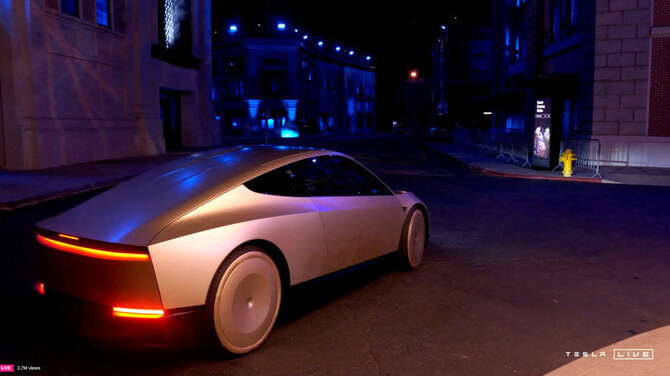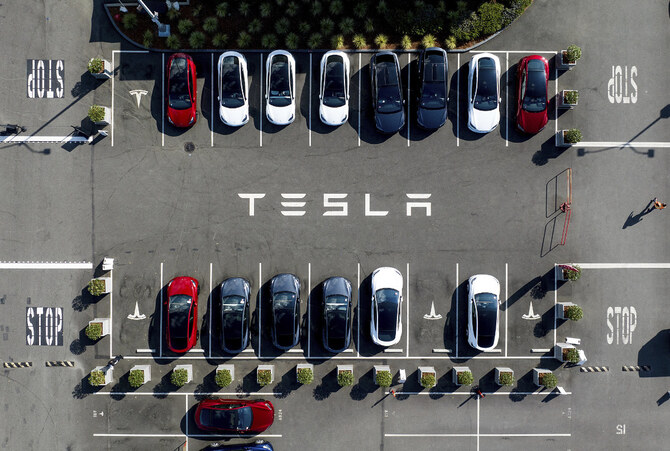Tesla CEO Elon Musk showcased a two-door robotaxi with gull-wing doors and no steering wheel or pedals at a much-hyped event on Thursday, sticking to long-held promises of autonomous cars driving long-term growth at the electric vehicle maker.
Musk traveled to the stage in a "Cybercab" and said production will start in 2026 with the vehicles being available to buy for less than $30,000.
"The autonomous future is here," Musk said. "We have 50 fully autonomous cars here tonight. You'll see model Ys and the Cybercab. All driverless."
The Cybercab will cost 20 cents a mile to operate over time, use inductive chargers and not require any plugs. They will also rely only on cameras and artificial intelligence, without the need for other hardware that robotaxi players use.
Musk also showcased a larger, self-driving vehicle — called Robovan — capable of carrying up to 20 people, and showed off Tesla's Optimus humanoid robot.

Tesla's robovan is unveiled at an event in Los Angeles, California, on October 10, 2024. (Tesla/Handout via REUTERS)
Enthusiasm around the event has been on display across social media for weeks, with screenshots of invites and speculation on what might be disclosed. But investors and analysts have flagged challenges with the technology and reined in expectations.
Musk's plan is to operate a fleet of self-driving Tesla taxis that passengers can hail through an app. Individual Tesla owners will also be able to make money on the app by listing their vehicles as robotaxis.
Thursday's event at the Warner Bros studio near Los Angeles, California, is titled "We, Robot" - an apparent nod to the "I, Robot" science-fiction short stories by American writer Isaac Asimov, but also echoes Musk's insistence that Tesla "should be thought of as an AI robotics company" rather than an automaker.
Those attending included investors, stock analysts and Tesla fans.
"Everything looks cool, but not much in terms of time lines, I'm a shareholder and pretty disappointed. I think the market wanted more definitive time lines," said Dennis Dick, equity trader at Triple D Trading. "I don't think he said much about anything... He didn't give much info."

Tesla's Optimus robots walk on the day of an unveiling event in Los Angeles, California,on October 10, 2024. (Tesla/Handout via REUTERS)
Missed promises
Musk said in 2019 he was "very confident" the company would have operational robotaxis by the next year. After missed promises, Musk this year diverted his focus to developing the vehicles after scrapping plans to build a smaller, cheaper car widely seen as essential to countering slowing EV demand.
Tesla is at risk of posting its first-ever decline in deliveries this year as buying incentives have failed to attract enough customers to its aging EV lineup. Steep price cuts meant to offset high interest rates have also squeezed profit margins.
Complicated technology and tight regulation have led to billion of dollars in loss for other companies attempting to crack the robotaxi market, forcing some to shut shop.
Some are still pushing, including General Motors' Cruise, Amazon's Zoox and Chinese firms such as WeRide.
Unlike expensive hardware such as lidar that others use, Musk is relying only on cameras and AI to run FSD to keep costs down. But FSD, which requires constant driver attention, has faced regulatory and legal scrutiny with at least two fatal accidents involving the technology.





























